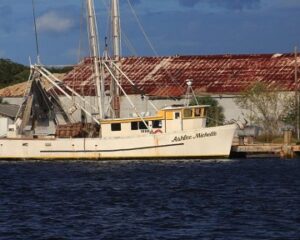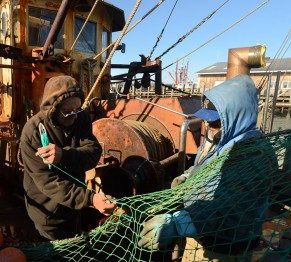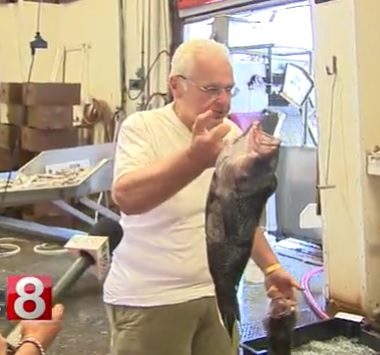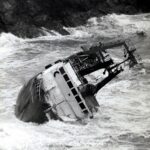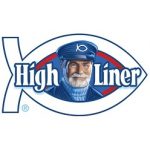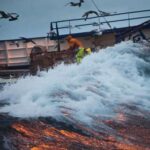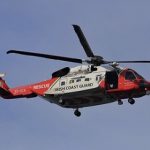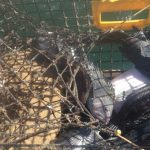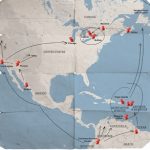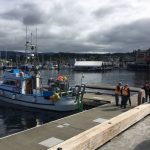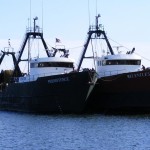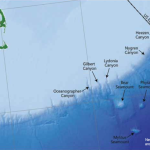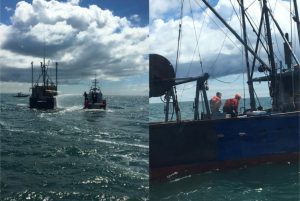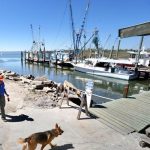You don’t see shrimp trawlers working the sea like you once did. You don’t see them coming in with their photogenic outriggers up. To be clear, trawlers still work the sea but nowhere in numbers like they once did.,, Times were you’d see them out at sea working, nets out, capturing shrimp. Beachgoers would see several trawlers with nets up coming home with a haul. Beachgoers and locals alike knew where to get fresh-caught shrimp and it was no marketing spin. It was the real deal, but those days are slipping away. Regulations, pollution, imports, inaccessible shrimping grounds, mariculture, maintenance costs, aging fleets, and other factors have put the hurt on the shrimping industry. >click to read< 07:36
Tag Archives: regulations
NH Gov. Kelly Ayotte joins Maine in rejecting new lobster regulations to protect industry
 New Hampshire has joined Maine in rejecting new regulations that would increase the minimum length of catchable lobster this summer. Republican Gov. Kelly Ayotte sent a letter to the Atlantic States Marine Fisheries Commission (ASMFC) that oversees lobster caught by New Hampshire and Maine fishermen, stating New Hampshire would not comply with the guidelines set to go into effect July 1. The new regulation requires an increase in the size of the gauge used by fishermen to measure lobster length, determining whether they can be caught or must be released. Lobstermen measure the size of a lobster by gauging its carapace (shell) from the eye socket to the tail. more, >>CLICK TO READ<< 16:36
New Hampshire has joined Maine in rejecting new regulations that would increase the minimum length of catchable lobster this summer. Republican Gov. Kelly Ayotte sent a letter to the Atlantic States Marine Fisheries Commission (ASMFC) that oversees lobster caught by New Hampshire and Maine fishermen, stating New Hampshire would not comply with the guidelines set to go into effect July 1. The new regulation requires an increase in the size of the gauge used by fishermen to measure lobster length, determining whether they can be caught or must be released. Lobstermen measure the size of a lobster by gauging its carapace (shell) from the eye socket to the tail. more, >>CLICK TO READ<< 16:36
NH and Maine lobstermen push back against new size rule amid economic fears
 The regulation involves an increase in the size of the gauge used by fishermen to measure lobster length to determine if they can be caught or must be released. The new rule, however, has received blowback from local lobstermen. Maine has opted not to implement the change in response to concerns from the lobster industry, while lawmakers in New Hampshire are advocating for their leaders to make a similar decision. State Rep. Aboul Khan, R-Seabrook, warns that the new rule could lead to a loss of a third of lobstermen’s catch this year, adding to the challenges already posed by existing regulations. more, >>CLICK TO READ<< 09:06
The regulation involves an increase in the size of the gauge used by fishermen to measure lobster length to determine if they can be caught or must be released. The new rule, however, has received blowback from local lobstermen. Maine has opted not to implement the change in response to concerns from the lobster industry, while lawmakers in New Hampshire are advocating for their leaders to make a similar decision. State Rep. Aboul Khan, R-Seabrook, warns that the new rule could lead to a loss of a third of lobstermen’s catch this year, adding to the challenges already posed by existing regulations. more, >>CLICK TO READ<< 09:06
First Circuit likely to save the whales despite lobstermen’s complaints
 An epic sea battle unfolded at the First Circuit Tuesday as Massachusetts fishermen tried to harpoon federal regulations that protect the North Atlantic right whale. But it appeared the judges were on the whales’ side and, as in “Moby Dick,” the fishermen may end up shipwrecked. At issue is a federal rule that limits lobster and Jonah crab fisheries’ use of buoy lines, which can entangle and kill whales. The fishermen’s lawyer, Daniel Cragg, told the judges that the rule resulted from Congress making a “drafting failure,” but the judges seemed incredulous. more, >>CLICK TO READ<< 10:52
An epic sea battle unfolded at the First Circuit Tuesday as Massachusetts fishermen tried to harpoon federal regulations that protect the North Atlantic right whale. But it appeared the judges were on the whales’ side and, as in “Moby Dick,” the fishermen may end up shipwrecked. At issue is a federal rule that limits lobster and Jonah crab fisheries’ use of buoy lines, which can entangle and kill whales. The fishermen’s lawyer, Daniel Cragg, told the judges that the rule resulted from Congress making a “drafting failure,” but the judges seemed incredulous. more, >>CLICK TO READ<< 10:52
Hundreds of Scots fisherman face losing jobs as new rules brand them too fat to fish
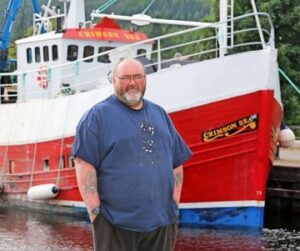 UK Government regulations which are about to come into force will mean seafarers must have a medical certificate showing a body mass index (BMI) of under 35 – or risk being banned from their own trawlers. Crewmen fear they will not be able to go to sea because of the draconian requirements. Furious fishermen branded the Maritime and Coastguard Agency (MCA) rules “discrimination”. Bob Dunsire, 49, who has been skippering prawn boats out of Pittenweem, Fife, since he was a teenager, said he can barely believe what is being done to the industry. He said: “I know I don’t have a BMI under 35 and I’m furious at these new medical requirements. They could see me out of my job and put my entire crew out of work, too. Photos, >click to read< 08:00
UK Government regulations which are about to come into force will mean seafarers must have a medical certificate showing a body mass index (BMI) of under 35 – or risk being banned from their own trawlers. Crewmen fear they will not be able to go to sea because of the draconian requirements. Furious fishermen branded the Maritime and Coastguard Agency (MCA) rules “discrimination”. Bob Dunsire, 49, who has been skippering prawn boats out of Pittenweem, Fife, since he was a teenager, said he can barely believe what is being done to the industry. He said: “I know I don’t have a BMI under 35 and I’m furious at these new medical requirements. They could see me out of my job and put my entire crew out of work, too. Photos, >click to read< 08:00
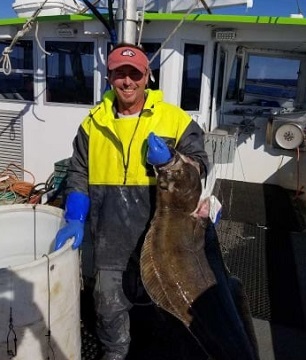
‘Enough is enough’: Midcoast lobsterman decries regulations to protect whales
Jason Lord, a second-generation Midcoast said he understands the effort to save critically endangered North Atlantic right whales. The problem, he contends, is lawmakers, government agencies and conservation groups have it wrong by targeting the Maine lobster industry, which has been forced to use breakaway trap lines and observe a seasonal no-fishing zone to protect the whales. “I’ve never seen a right whale off the coast of Maine,” said Lord, 50, who has been in the industry for 30 years. An Arizona congressman recently proposed a bill that could lead to further regulations like ropeless lobster traps. Last week, Maine Lobstering Union Local 207 Executive Liaison and Political Director Virginia Olsen testified against the bill on Capitol Hill. >click to read< 18:23
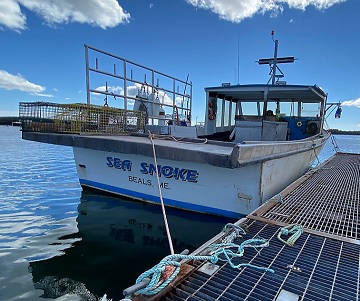
Maine lobster industry must accept that ‘big changes are coming’ despite delay in federal rules, commissioner says
“The work now is critical,” DMR Commissioner Patrick Keliher told the Lobster Advisory Council Wednesday. “The buy-in is critical. The data we’re going to be collecting over the next four years is critical. We can’t have infighting. We have to accept big changes are coming. ”Those changes could include additional regulations to make ropes weaker, a move toward ropeless lobster traps and additional restrictions on fishing grounds. Between now and then, the industry needs to report its harvest to federal officials, participate in a vessel tracking program and find ways to help monitor where endangered whales are migrating, Keliher said. >click to read< 08:49

Court decision offers new hope for Maine lobstermen fighting new regulations
A small sign of hope for Maine Lobstermen as a federal judge in D.C. District Court has ruled that new lobster fishing restrictions designed to protect North Atlantic Right Whales will be delayed until 2024 to give the government time to draft more effective regulations. “We need to have time to get this done right,” said Maine Lobstering Union Executive Director Virginia Olsen. Judge Boasberg had previously ruled that fishing restrictions issued by the National Oceanic and Atmospheric Administration, or NOAA didn’t go far enough to protect the whales. His new ruling sends the current biological opinion, which is the document containing the rules and the science behind them, back to NOAA. >click to read< 10:43

Fishery regulators will discuss possible rise in minimum lobster size
Fishing regulators will gather in Virginia next week to talk about the potential of raising the minimum size lobsters need to be in order to be harvested by New England fishermen. The Atlantic State Marine Fisheries Commission’s lobster management board is meeting on Tuesday to discuss the implications of a proposal that would install new minimum size limits and other regulations for the crustaceans, either gradually over time or triggered by lobster populations dipping below a certain level. The proposal was drafted to protect the lobster population as surveys show indications of potential future decline. The idea has rankled many Maine lobstermen,,, >click to read< 09:25
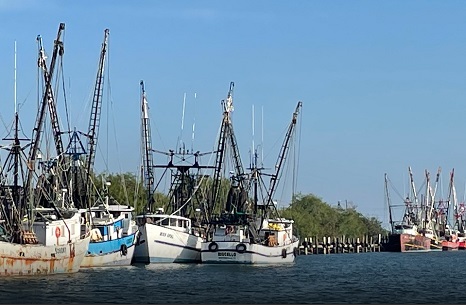
Texas: New shrimp season tangled up in regulations
That plate of fried shrimp people enjoy at a restaurant –whether locally or away from home – could either be taken off the menus or cost a lot more. The tastier Gulf shrimp caught by trawlers off the Texas Gulf Coast from the Brownsville/Port Isabel to the Palacios areas could also be replaced by farmed-raised crustaceans. That’s because this South Texas industry – one of the nation’s largest – is caught in the middle of a crisis caused by today’s U.S. immigration policies and by what is going on in countries south of Mexico. The expected arrival of hundreds of people who traditionally work on the boats, known as shrimp headers, is on halt right now; yet the kickoff of the 2022 season is about two weeks away. >click to read< 17:53

Who’s really in the trap? How new right whale regs are hurting Maine’s lobster industry
I was five years old, opening my family’s refrigerator door in search of a juice box, when a live lobster fell out and started thrashing around on the floor. Naturally, I immediately screamed and ran out of the kitchen at the sight of this crustacean monster. That was the first time I really put the pieces together of what my father did for a living. As a local Maine lobsterman, he would often bring home portions of his catch while I was growing up. I’m not sure if that would be the case now if he were still in the industry. Even in the short span of my lifetime, the Maine fishing industry has faced new challenges as the world changes around us. >click to read < By Hajna Nagy15:43
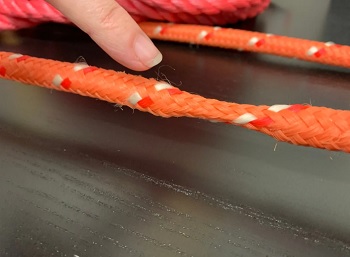
Lobster gear change enforcement delayed because of supply change issues
NOAA said Wednesday morning that it will use a “graduated enforcement effort” until the supply issues have been resolved. The regulations require lobstermen to splice NOAA-approved weak rope or weak plastic links into the lines they use to connect buoys to traps on the ocean floor. But the approved gear has been in short supply as manufacturers struggle to produce enough to outfit the weak rope or weak plastic links fishing fleets. The regulations are intended to prevent whales from becoming entangled in fishing gear, which can result in grave injury or death. >click to read< 13:49
Susan Collins – Scarcity of required gear is making it extremely difficult for lobstermen to meet the May 1st deadline – >click to read< 14:48
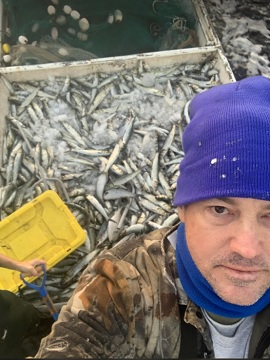
Us against Them
I’ve been commercial fishing since I was 17 and I’m 51 now and I’ve been forced out of several fisheries due to regulations, permits and closures. I would like to make an observation, every time I visit this group, I read several posts about someone else about to lose their livelihood and a part of their soul to another regulation or closure by people who we don’t know and, on most occasions, never even see. Do any of you really think this is the natural way of things or maybe this is planned out? >click to read< 15:42, By Gunner Gause
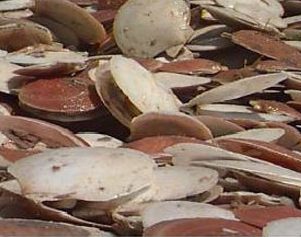
NOAA: Final Rule for Amendment 21 to the Atlantic Sea Scallop Fishery Management Plan
NOAA Fisheries filed a final rule to implement Amendment 21 to the Atlantic Sea Scallop Fishery Management Plan. The New England Fishery Management Council developed Amendment 21 to adjust the management of the Northern Gulf of Maine as well as the limited access general category individual fishing quota program to support overall economic performance of the fishery while allowing for continued participation in the general category fishery. Amendment 21, >click to read< 13:03

New Regulations for Whelk and Horseshoe Crabs a Challenge for Commercial Fisheries
New state regulations intended to rebuild the whelk and horseshoe crab populations in the Long Island Sound could substantially limit the catches of local fisherman. Davis said that the department had done surveys trawling different areas of the Long Island Sound each year. Asked about the proposed regulations, Bob Guzzo, a commercial fisherman out of Stonington who catches whelk, said he thought the regulations were unnecessary, and that the department shouldn’t be involved in making them. He said that the whelks come and go in cycles. Guzzo said he believed the trawl surveys were inaccurate. >click to read< 14:16
CT DEEP Proposing New Rules For Lobster, Striped Bass, Others – The proposed regulatory changes are intended to address the “depleted state of these ecologically and economically important species in Long Island Sound,” according to DEEP officials. >click to read< 17:02
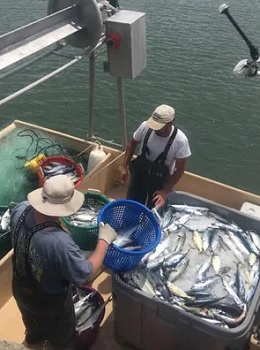
“We’re in pretty bad shape,” Commercial fishermen, fishing industry decline over the past 20 years
North Carolina commercial fishermen have complained for decades that government regulations and a variety of other factors threaten their livelihood and have them headed the way of endangered species. Glenn Skinner of Newport, executive director of the North Carolina Fisheries Association an advocacy group of commercial fishermen, said statistics back that up. “These declines are the result of many different factors. with regulations, the fear of future regulations or outright bans on commercial fishing gears being a significant factor,” Skinner said. He said public perception and political agendas drive the regulations. >click to read< 11:26

New DFO regulations, 30 major commercial stocks have been identified for rebuilding
Canada is putting into law a requirement that it rebuild depleted commercial fish stocks, starting with 17 stocks that include Atlantic cod off Newfoundland, spring spawning herring in the Gulf of St. Lawrence and three Pacific salmon stocks. They account for more than half the 30 major commercial stocks identified for specific protection in amended Fisheries Act regulations published Jan. 2. >click to read< 11:33

Lifelong Ucluelet fisherman Doug Kimoto shares his thoughts on restoring fisheries
Doug Kimoto’s livelihood begins with a 42-foot commercial salmon troller named ‘La Perouse.’ The wooden fishing vessel has been a member of his Japanese-Canadian family for 70 years. “I started commercial fishing with my father when I was about 13-years-old,” His father, Tom Kimoto, lost about 10 years of his life as a result of being forced into a Canadian Japenese internment camp, Kimoto recalls. “These last few years, it’s been a disaster,” he says. “Years ago you could make a decent living, but now it’s down to what you’d call not even a minimum wage for most fishermen.” >click to read< 07:03
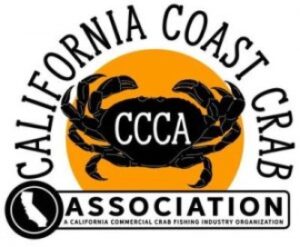
Extended Closure of CA Dungeness Crab Fishing Season Will Hurt Working Families, Eliminate Holiday Crab Traditions
“Since mid-November, fishermen have had to sit idle at the dock and accept delays in the opening of their crab season due to the new, highly restrictive and unfair RAMP rules. “And now the season is being postponed for a full month,” said Ben Platt, president of the California Coast Crab Association (CCCA). Called the Risk Assessment Mitigation Program (RAMP), the new CDFW rules are more restrictive than even the strictest fishery laws in the nation,,, Our fishery is having zero impact on the species,,, “This is a huge success story, and in light of it, the new regulations constitute a solution in the absence of any real problem,” >click to read< 11:29
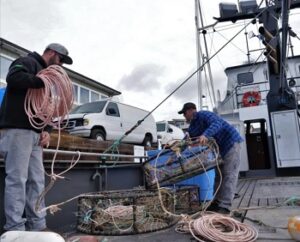
Monterey Bay Fishermen hit with new wave of Dungeness crab season delays
You couldn’t blame crab fishermen Tim and Dan Obert for feeling like they’re passing through the perfect storm. First there was the pandemic, which shut down restaurants and, in turn, much of the demand for Dungeness crab. Then a new regulation took effect on Nov. 1 that heavily restricts the Dungeness fishery’s operations when whales and sea turtles are around. Then the state delayed the opening of the Dungeness crab season until after Thanksgiving. “If you take all three of those things, you will destroy this fishery,” said Tim Obert, 35, of Scotts Valley. “There will be no crabbers left.” >click to read< 08:47
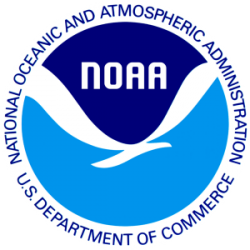
Update on Fishery Observer Program Restart, Which Resumes July 1st
On May 29, NOAA Fisheries announced that on July 1, the waiver of fishery monitoring will expire, and we will begin deploying observers and at-sea monitors on vessels fishing in northeast fisheries. In a letter released today, Northeast Fisheries Science Center Director Jon Hare is providing an update on preparations for a safe and efficient redeployment. For more details and to download the letter, >click to read< 18:30

Advisory: 2019 Commercial Fluke Trip Limit to Increase on November 1st
Effective November 1, 2019 through the end of the year, all commercial closed fishing days for summer flounder days will be eliminated thereby allowing commercial fishermen to fish for, possess and land summer flounder seven-days per week and the commercial trip limit will be increased to 1,000 pounds for all gear types (Declaration Notice). This will allow vessels fishing offshore to have greater access to the state’s remaining 2019 commercial summer flounder quota (about 240,000 pounds). >click to read< 15:37
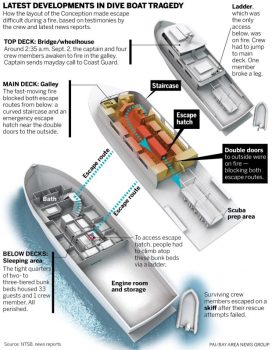
What we know and don’t know about dive boat Conception’s demise – crew, ship and regulations are all under scrutiny
Amid anguish over 34 lives lost in the fire that consumed a recreational diving boat off the Channel Islands this week — one of the worst passenger boat accidents in modern history — a central question lingers: What could have caused such a swift, deadly catastrophe? Speculation has swirled from overheated lithium batteries in charging cell phones and laptops to enhanced oxygen to prolong dives and electrical wiring. But as investigators probe the Labor Day disaster, attention is focusing on three key areas: the crew’s actions and training, the boat’s design and construction, and the regulations governing the operation. >click to read< 14:06
Search warrants served in California boat fire investigation –>click to read< 18:16

Lobstermen enjoy star-studded show of support in Stonington
The empire strikes back! That would be the Maine coast lobster empire.,,, Last Sunday, lobstermen, their friends and families gathered on the pier in Stonington to let loose about regulations, bureaucrats and the horse they rode in on. They came from all over the Downeast coast, several hundred strong, and stood in a baking sun for two hours, first to bear witness to the shortcomings of federal research and then to listen to a star-studded roster of Maine politicians pledge their support for the lobster industry. >click to read< 11:08
From the Legislature: Lobsters and Right Whales, Rep. Allison Hepler – >click to read<
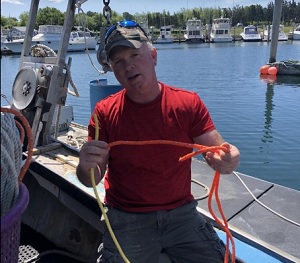
New regulations could put added strain on lobster fishermen
The July 4 holiday has always been a busy time for Rob Martin, a commercial lobsterman who steams out of Sandwich Marina.,,, Seasonal gear bans to protect North Atlantic Right Whales in Cape Cod Bay and surrounding waters usually end May 1, but this year lobstermen in the bay were off the water until May 10,,, More than a month later on June 16, several lobstermen were off the water again, but this time not by state edict. They were in district court in Boston to support a fellow lobsterman who was being sued, along with other groups and government agencies, by activist Richard “Max” Strahan. >click to read< 09:50
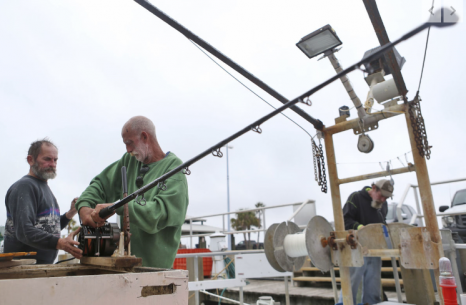
Spend a day in the life of a Florida tuna fisherman
A white scar carved across Carl Roby’s hand tells the story of the time a tuna, a creature he has spent decades harvesting, almost won. It was late. He and his crew were pulling in the miles’ worth of line they strung out earlier that day with hundreds of hooks. It’s methodical work, pulling the line in hand-over-hand and raveling it back onto the spools. The bright spot is when a yellowfin tuna, sleek, strong and worth hundreds, glimmers just under the water. Roby had been fishing for decades at this point. He started as a teenager in the 1970s,,>click to read<21:43

Court Slaps Down The First Legal Challenge To Trump’s ‘1-In, 2-Out’ Policy
A federal court dismissed a coalition of liberal activists’ lawsuit against President Donald Trump’s executive order that two regulations be repealed for every new one that’s proposed, also known as the “1-in, 2-out” policy. Public Citizen, the Natural Resources Defense Council (NRDC) and the Communications Workers of America (CWA) argued Trump’s deregulation order was unconstitutional, but the D.C. district court ruled the plaintiffs failed to show Trump’s executive order caused any injury that would give them standing to sue. >click to read< 12:10
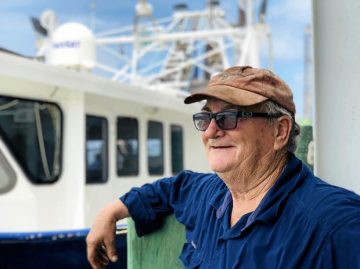
Rife with regulations: 50-year fisherman sells over demands
AFTER half a century working at sea, Daniel Pope says the increase in regulations has forced him to retire from the fishing industry. The 67-year-old commercial fisherman has sold his prawn trawler to a Cairns buyer, and will step off the boat for the last time on January 17. Over the past 50 years, Mr Pope has witnessed the industry grow and evolve and said the increase in regulations was getting out of hand. “I believe the fishery is the best I’ve seen it, or as good as I’ve seen it in 50 years,” he said. click here to read the story 15:19






